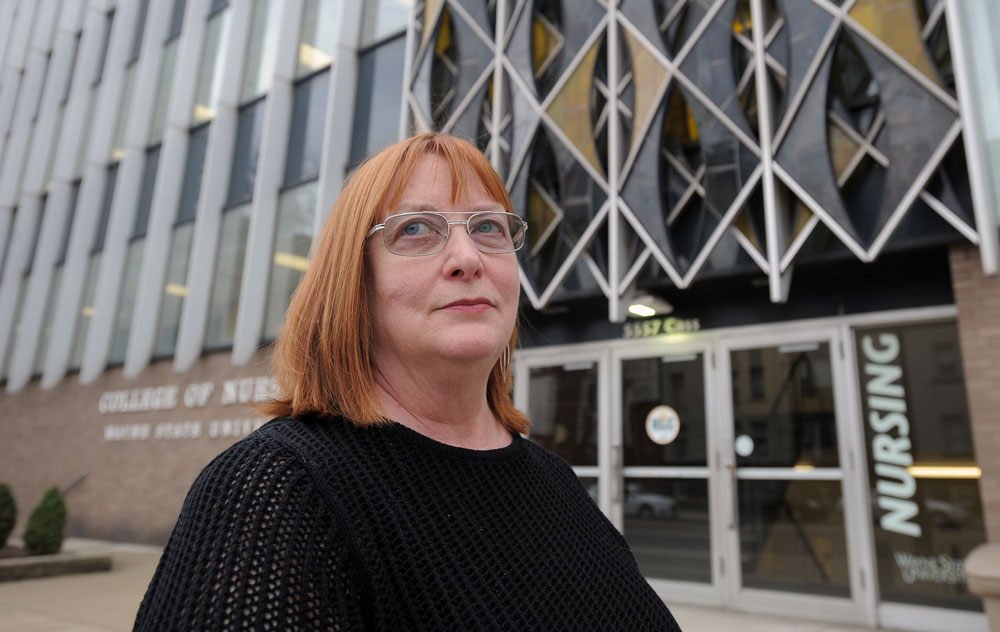Nursing researcher seeks to improve comfort for end-of-life patients
Shortness of breath, also known as dyspnea, can cause severe discomfort in people approaching the end of life. Researchers at the WSU College of Nursing could play a crucial role in providing improved care and comfort for these patients.
 Professor Margaret L. Campbell, Ph.D., RN, is dedicated to research that furthers the ability of physicians and nurses to recognize and treat dyspnea in dying patients. To assess respiratory distress in patients who can no longer self-report dyspnea, she developed and tested the Respiratory Distress Observation Scale (RDOS). This scale has been translated into four languages since Campbell and her team published it in 2010, and is used by clinicians around the world.
Professor Margaret L. Campbell, Ph.D., RN, is dedicated to research that furthers the ability of physicians and nurses to recognize and treat dyspnea in dying patients. To assess respiratory distress in patients who can no longer self-report dyspnea, she developed and tested the Respiratory Distress Observation Scale (RDOS). This scale has been translated into four languages since Campbell and her team published it in 2010, and is used by clinicians around the world.
Since creating the RDOS, Campbell has focused her research on dyspnea treatment, particularly for patients who are removed from mechanical ventilation, a form of life support. Using the RDOS, she developed an algorithm to guide nurses and respiratory therapists through assessment and treatment when withdrawing mechanical ventilation to ensure patient comfort. Currently, no standard procedure for this exists.
“The manner in which mechanical ventilation is withdrawn at the end of life varies based on local custom, who’s rounding in the unit, and on the nurses’ confidence and experience,” says Campbell. “Because it’s not guided by an objective measure of patient distress, there are examples that I’ve seen in practice and in the literature of overmedication and clinical examples of undermedication.”
Campbell’s algorithm uses a number of evidence-based decision trees to guide nurses through the process of weaning ventilation. Clinicians monitor the patient closely. If the RDOS score increases, signifying respiratory distress, nurses pause the treatment and administer medication until the patient is comfortable. If the score remains acceptable, the process continues without further medication.
A pilot study found Campbell’s algorithm superior to unstandardized usual care. In October 2016, the National Institutes of Health awarded her a $2.4 million grant for a five-year study in four Detroit-area hospitals, including Henry Ford, Detroit Receiving, Harper University and William Beaumont. The grant is the largest single award in the history of the College of Nursing. Findings of this study could be the first step in creating a standard procedure for ventilator withdrawal that supports patient comfort at the end of life.
The study began in late 2016, with research assistants observing nursing care and patient comfort at participating hospitals as they followed their sites’ existing processes for removing ventilator support. Once the required number of patients enrolls at each site, nurses will begin using Campbell’s algorithm while research assistants continue to observe nursing care and patient responses.
The decision to stop life support is made when an ICU team recognizes that the patient will no longer benefit from continued breathing support. A meeting is held with the patient’s family to discuss removing life support; after the decision is made, withdrawal can happen immediately. Other times, the family chooses to wait. The timing is crucial for Campbell’s team.
Program Coordinator Myung (Mae) Nordin oversees the research assistants and coordinates schedules. She says the team must remain flexible and ready to spring into action at a moment’s notice.
Currently, 12 research assistants are working on the study at four sites. As the work continues, Campbell hopes to add students; given its delicate nature, choosing the right research assistants is crucial.
“Because of the sensitivity of this topic, my research assistants must have clinical experience,” says Campbell. “If it were a study of 500 patients with kidney disease looking at Drug A or Drug B, I could train anybody because there’s not a lot of high sensitivity in those industry-sponsored clinical trials. But nursing research is different because we’re dealing with human responses; you bring that in and it’s less predictable, and requires both exquisite clinical knowledge and nursing’s recognized sensitivity and compassion.”
Campbell hopes the study will ultimately lead to a global standard for addressing treatment of dyspnea during ventilator withdrawal, and hopes to build support for it as she shares results with her colleagues.
“Getting research findings into practice is hard because we often aren’t in the clinical setting to make our findings translate. It’s up to the clinicians to embrace and implement it,” she says. “My hope is to make this algorithm available by publishing it, but also to be invited to places to talk and consult about how to roll it out. But it will first become the standard of care at four Detroit-area hospitals.”
The study has finished its first year. In years two through four, Campbell and her team will collect results, and then analyze them in the study’s fifth and final year. As the study continues, however, the focus on supporting top-notch care for patients and their families will remain.
“Providing excellent comfort-focused care to dying patients is our last chance,” Campbell says. “Nurses promise terminally ill patients that we will keep them comfortable and expertly cared for until the end of life.” Margaret Campbell (above) is working with a team of 12 research assistants (pictured on the previous page and at right), whose contributions she calls crucial to her study’s success.
Note: This article originally appeared in the College of Nursing's Fall 2017 Urban Health Magazine, p. 20: https://nursing.wayne.edu/about/nur_f2017magazine.pdf